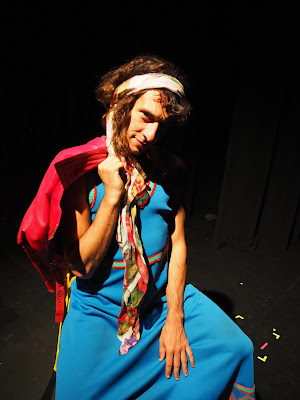Review: In "As Sylvia," a Young Transwoman Looks to the Past and Her Future
As Sylvia
Written by Summer Minerva
Directed by Cecil Baldwin
Presented at The Kraine Theater
85 E 4th St., Manhattan, NYC
June 18-July 3, 2022
 |
| Summer Pilaf. Photo courtesy Emily Owens PR |
When the play, set in S's small, somewhat cluttered bedroom, opens, S is planning to meet a man from a dating app. While she laments that she has love without sex and sex without love, who, she asks, not for the only time, doesn't like to feel wanted? In preparation, S offers a prayer–notably including a request to the Goddess for safety–at an altar that includes photographs of Rivera, who acts sometimes as an inner voice and whose words, S says, help her to express things she otherwise couldn't. S, in fact, allows us to hear from Rivera in her own words–collected from interviews and speeches, including this one in 1973–by speaking intermittently, well, as Sylvia–heavy New York City accent included. (S idolizes but, importantly, does not idealize Rivera, acknowledging that Rivera, like anyone, trans or otherwise, had her own flaws.) One of the resonances that emerges between S's life and Rivera's is involvement (like, S observes, a disproportionate number of trans women) in forms of sex work–as S says, the body is one's only resource under capitalism, and as Penny writes, "women are alienated from their bodies in the same way that all workers are alienated from ownership of their labour," making any attempt to "reclaim" that body equivalent to a "sit-in or an occupation" (166)–S, indeed, recounts a literal sit-in staged by Rivera. S protests the reduction of trans women to their bodies and feels conflicted about allowing others to "use" her body, whether or not money is involved. S also admits to romanticizing the solidarity of the queer community in a pre-gentrification Village, mirroring Rivera's own critiques of the movements to which she gave herself: S critiques the way that subversion has been monetized out of queer communities, while, as Sylvia, noting the lack of support that Rivera and other drag queens received from the gay liberation movement. Climatically, S recounts an experience that reminds both her and us that White heteropatriarchal cosmologies are not the only way to see and be in the world–but will this reminder prompt S to her own act of self-reclamation?
Minerva is an engaging, often funny presence, adeptly investing the audience in both S and "Mother Sylvia." The show does not shy from thorniness or critique, but it also celebrates community, speaking out, and self-worth. From As Sylvia's polyvocality emerges its own distinctive voice.
-John R. Ziegler and Leah Richards



Comments
Post a Comment